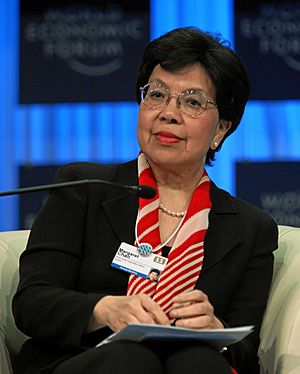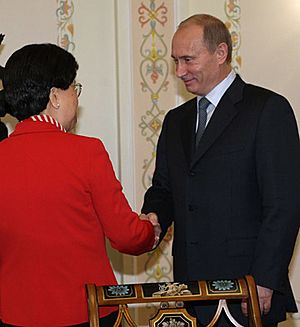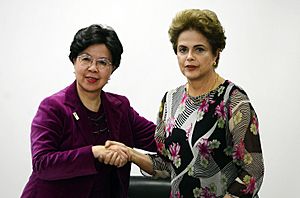Margaret Chan facts for kids
Quick facts for kids
Margaret Chan
|
|
|---|---|
|
陳馮富珍
|
|

Chan in 2011
|
|
| 7th Director-General of the World Health Organization | |
| In office 9 November 2006 – 1 July 2017 |
|
| Preceded by | Anders Nordström (acting) |
| Succeeded by | Tedros Adhanom Ghebreyesus |
| 4th Director of Health, Hong Kong | |
| In office 6 June 1994 – 20 August 2003 |
|
| Preceded by | Lee Shu-Hung |
| Succeeded by | Lam Ping-Yan |
| Personal details | |
| Born |
Margaret Fung Fu-chun
21 August 1947 British Hong Kong |
| Nationality | Chinese Canadian |
| Spouse | David Chan |
| Alma mater | Northecote College of Education (Cert) University of Western Ontario (BA, MD) National University of Singapore (MS) |
| Margaret Chan | |||||||||||
|---|---|---|---|---|---|---|---|---|---|---|---|
| Traditional Chinese | 陳馮富珍 | ||||||||||
| Simplified Chinese | 陈冯富珍 | ||||||||||
|
|||||||||||
Margaret Chan Fung Fu-chun, born on August 21, 1947, is a doctor from China and Canada. She is also involved in politics. She was the head of the World Health Organization (WHO) from 2006 to 2017. Before that, she worked as the Director of Health for the Hong Kong Government from 1994 to 2003.
Later, she became an Assistant Director-General at the WHO. In 2014, Forbes magazine said she was the 30th most powerful woman in the world. In 2018, she joined a group called the Chinese People's Political Consultative Conference (CPPCC).
During her time as Director of Health in Hong Kong, she faced challenges like the 1997 H5N1 bird flu and the 2003 SARS outbreaks. She also faced some criticism during her time leading the WHO.
Contents
Margaret Chan's Early Life and Education
Margaret Chan grew up in British Hong Kong. Her family came from a place called Shunde in Guangdong, China.
Her Schooling and Degrees
She first studied teaching and home economics at the Education University of Hong Kong. In 1973, she earned a bachelor's degree in home economics. Then, in 1977, she became a medical doctor from the University of Western Ontario in Canada. She continued her studies and received a master's degree in public health from the National University of Singapore in 1985.
In 1991, she also completed a special management program at Harvard Business School.
Margaret Chan's Career Journey
Starting Her Career in Hong Kong
Margaret Chan began working for the Government of British Hong Kong in December 1978 as a medical officer. She moved up in her career, becoming an assistant director in the Department of Health in 1989. By 1992, she was a deputy director.
In June 1994, she made history by becoming the first woman to lead the Department of Health in Hong Kong.
Leading Health in Hong Kong (1994–2003)
Margaret Chan continued in her role when Hong Kong became part of the People's Republic of China in 1997. She became well-known for how she handled two major health crises: the 1997 H5N1 bird flu and the 2003 SARS outbreak.
Handling the Bird Flu Outbreak
When the first cases of H5N1 bird flu appeared, Chan tried to calm people in Hong Kong. She made statements to reassure them. However, as more cases appeared, some people felt she had misled the public. In the end, she helped control the outbreak by ordering the removal of 1.5 million chickens in the area. This was a difficult decision, but it helped stop the spread of the disease.
Facing the SARS Outbreak
Her actions during the SARS outbreak, which sadly led to 299 deaths, also received strong reactions. Some people and the Legislative Council of Hong Kong criticized her. They felt she was too slow to act and trusted misleading information.
However, a special committee later looked into how the crisis was handled. They said that the problems were not just her fault. They pointed to how Hong Kong's health system was set up, with different parts not sharing information easily.
Working at the World Health Organization
In August 2003, Margaret Chan left the Hong Kong Government after 25 years. She then joined the World Health Organization (WHO).
She first worked as a Director in the Sustainable Development and Healthy Environment Department. Later, in 2005, she became an Assistant Director-General. From 2003 to 2005, she also served as the WHO Director-General's Representative for Pandemic Influenza.
Leading the WHO (2006–2017)
Margaret Chan served two five-year terms as the Director-General of the WHO. She was first appointed in November 2006. She said her main goal was to improve the health of people in Africa and the health of women. She wanted the WHO to focus on those who needed help the most.
On January 18, 2012, she was chosen for a second term. The World Health Assembly confirmed this on May 23, 2012. In her acceptance speech, she spoke about "universal coverage" in health care. This means making sure everyone has access to health services. Her second term began on July 1, 2012, and ended on June 30, 2017.
First Term Challenges

In 2007, some groups, like Doctors Without Borders, were upset when Chan questioned the quality of generic medicines.
In 2010, she was criticized for being too alarmed about the 2009 flu pandemic. The pandemic turned out to be less severe than expected.
After visiting North Korea in 2010, Chan said the country had problems with nutrition. However, she also noted that its health system had many medical staff. She mentioned there were no signs of obesity, which was a growing problem elsewhere. These comments were different from what a previous WHO leader had said. Some critics felt her statements were "surreal."
In 2011, due to money problems in countries that donate to the WHO, the organization had to cut its budget. Under Chan's leadership, the WHO reduced its budget by almost $1 billion and cut 300 jobs.
Second Term Challenges

In 2013, the WHO was accused of being too cooperative with the Syrian government. This happened when polio reappeared in Syria.
In 2014 and 2015, Chan faced strong criticism again. This was because the WHO's response to the Ebola virus epidemic in West Africa was seen as too slow.
In 2016, she started the Health Emergencies Programme. This program was created to help the WHO respond better to health crises around the world.
After Her Time at WHO
After leaving the WHO, Margaret Chan continued to work in global health. In 2018, she joined a group focused on how government money policies can improve health. This group was started by Michael R. Bloomberg and Lawrence H. Summers. That same year, she also became an advisor for the Boao Forum for Asia.
In December 2021, during an election in Hong Kong, Chan said the new election system would be good for Hong Kong's future. In August 2022, after a visit to Taiwan by a US official, Chan commented on the situation.
Other Activities
- She is a member of the Senior Advisory Board for Exemplars in Global Health since 2020.
Recognition and Awards
In 1997, Margaret Chan was recognized by the Royal College of Physicians in the United Kingdom. She was also appointed as an Officer of the Order of the British Empire by Queen Elizabeth II.
In 2014, Forbes magazine ranked her as the 30th most powerful woman in the world. This was because of her important role as Director-General of the WHO. Her ranking had gone up from 33rd in 2013.
Personal Life
Margaret Chan is married to David Chan. He is an eye doctor, also known as an ophthalmologist.
See also
 In Spanish: Margaret Chan para niños
In Spanish: Margaret Chan para niños
 | Madam C. J. Walker |
 | Janet Emerson Bashen |
 | Annie Turnbo Malone |
 | Maggie L. Walker |

